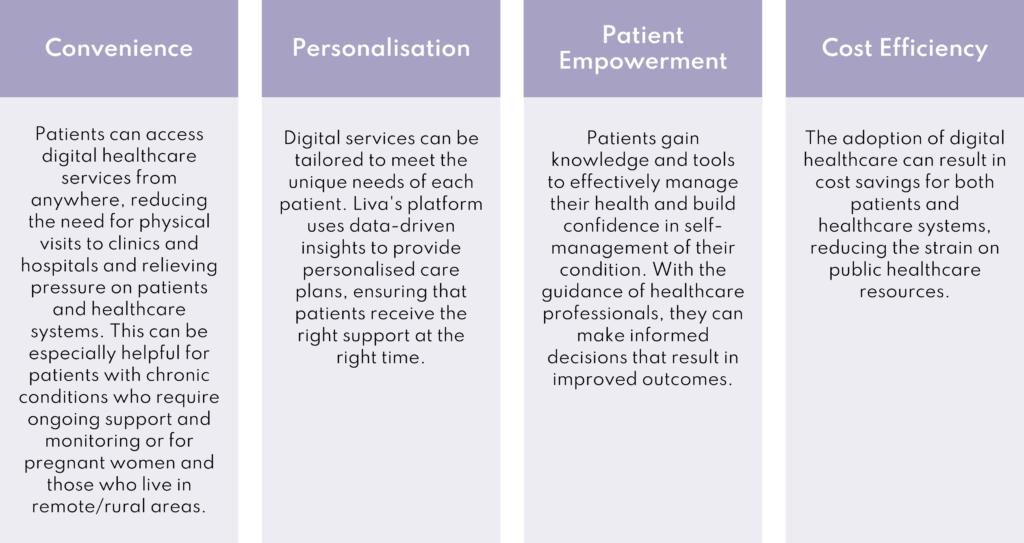Delivering digital healthcare services in the NHS
In this blog post from Ditte Hjorth Laursen, Head of Project Management and Research at Liva Healthcare, she explains the importance of digital healthcare and how Liva’s digital platform is being used to support patients in the NHS and participants in the Bump2Baby and Me trial.
In an era marked by the ever-accelerating pace of technological advancement, the landscape of healthcare is rapidly evolving. The UK’s National Health Service (NHS) has been at the forefront of this transformation, embracing digital services to increase accessibility, and reduce the burden on traditional healthcare systems. With an increasing number of people living with lifestyle related conditions there is an urgent need to adapt new solutions. Liva Healthcare is one of the pioneering platforms at the forefront of this digital healthcare transformation, offering programmes that cater to the evolving interest, demand, acceptability, and benefits of digital and remote healthcare.
A Shift in Healthcare Paradigm
The COVID-19 pandemic has catalysed a shift in how healthcare is delivered. With the need for social distancing and the increased pressure on healthcare resources, digital and remote services have emerged as a vital component in the healthcare landscape. Patients are not just seeking but actively demanding convenient, accessible, and personalised healthcare options. This paradigm shift has paved the way for the adoption of digital healthcare services.
As the interest in digital healthcare grows, so does the demand. Patients are now more tech-savvy and informed, increasingly seeking out solutions that provide them with easy access to healthcare advice, monitoring, and support. Liva’s programmes align perfectly with these patient needs. Their digital platform offers a range of evidence-based programmes, empowering patients to take control of their health and engage with healthcare providers from the comfort of their homes. Since the launch of Liva’s diabetes prevention service in 2019, the number of people choosing the Liva digital service has increased by over 200% which underlines the increasing interest in this type of programme.
With the increasing interest there is now also increasing evidence proving the effect of digital interventions. In a recent publication that evaluated the NHS Diabetes Prevention Programme, the authors compared weight loss outcomes between face-to-face and digital participants. The results showed that people who chose the digital program lost 1 kg more weight after 9 months than those who participated in the face-to-face group1. So, the effect is documented.
When discussing digital healthcare, concern is often raised in relation to health inequality and accessibility barriers. The Liva team engages in service evaluation and other quality improvement activities to ensure their programmes are meeting the needs of their patient population. Liva is working with a holistic approach to service delivery that shouldn’t create any systematic differences in outcomes across demographic indicators. In fact, new evidence show that people with short and medium long educational levels have the best outcomes on our programmes (internal data). Liva’s ability to deliver their programmes in 22 different languages also opens up access to a more diverse patient population.
Acceptability and Benefits of Digital Healthcare
Digital healthcare services have not only piqued the interest and met the demand of patients but have also gained acceptability among healthcare providers and policymakers. While there are numerous advantages to this modality, its four main benefits are:

The Future of Healthcare
Liva has emerged as a key player in digital healthcare transformation. Their programmes offer a range of services, from managing chronic conditions such as diabetes, prediabetes and obesity to overall physical and mental wellbeing. These programmes can enable healthcare providers to reach more patients, deliver more efficient care, and improve health outcomes.
As digital healthcare services continue to gain momentum, the NHS and companies like Liva are setting the stage for a healthcare future that is patient-centred, technologically advanced, and economically sustainable. This transformation is not only about adopting digital tools; it’s about reshaping the healthcare experience, placing control in the hands of patients, and making healthcare more inclusive and accessible.
Liva Healthcare and Bump2Baby and Me
The Liva Healthcare platform has been tailored to deliver the Bump2Baby and Me mHealth Coaching Programme as part of the Impact Diabetes Bump2Baby and Me project.
The Bump2Baby and Me mHealth Coaching Programme was used in the project as part of a randomised control trial. In the trial, the intervention group received access to the Liva app and support from a Liva health coach, while the control group received usual care. The programme provided women with evidence-based healthy eating and exercise information, both during pregnancy and for the first year after birth, via a smartphone app and real-life health coach. The trial focuses on working with women who are identified at high risk of gestational diabetes and who will therefore benefit most from this behaviour change intervention.
The trial ended in September 2023 and initial project results will be available in Spring 2024.
References
1 Marshden et al. 2023. The effectiveness of digital delivery versus group-based face-to-face delivery of the English National Health Service Diabetes Prevention Programme: a non-inferiority retrospective cohort comparison study.
